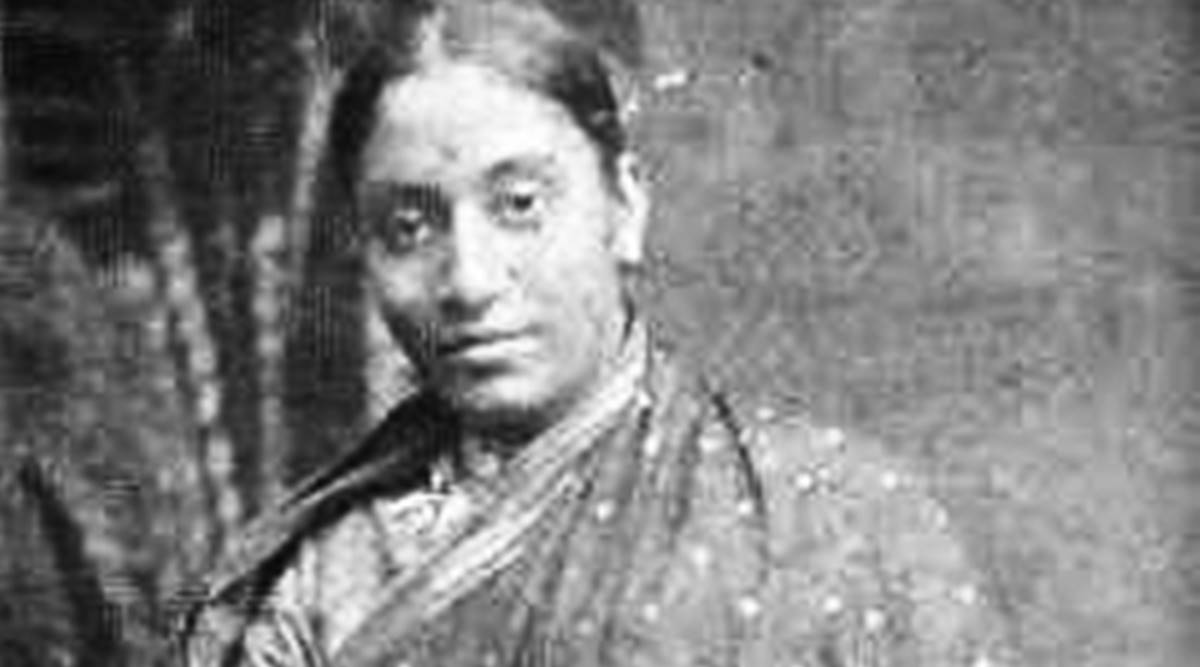 Rukhmabai became India’s first woman medical practitioner.
(Wikimedia Commons)
Rukhmabai became India’s first woman medical practitioner.
(Wikimedia Commons) Next week, the Supreme Court will start yet another examination of the law on restitution of conjugal rights, which allows a spouse to move court to compel the other spouse to cohabit, or face forfeiture of any property.
The Victorian law has been tested several times before but has survived in the statute books.
But long back, when the concept of restitution of conjugal rights faced its first legal test in 1885, 22-year-old Rukhmabai had very little except her fortitude to fight the battle. In a never before act of defiance she refused to
cohabit and solemnise her marriage with her husband Dadaji Bhikaji, that had taken place when she was just 11 years old.
On April 9, 1887, a trial began against her before the Bombay High Court on a suit for restitution of conjugal rights that was filed by her husband.
The same day, a pseudonymous letter by her her signed as ‘A Hindu Lady, appeared in The Times. Rukhmabai wrote, “My dear Madam, I would thank you very much for the interest you so kindly take in my unfortunate trial, and in my native sisters in general.”
Moved by the letter, judge Robert Pinhey stopped Rukhmabai’s lawyer from beginning his defence and announced that he had reached a verdict. “Mr Advocate-General, unless you are particularly anxious to make some remarks for the assistance of the Court, I think I need not trouble you as I am prepared to dispose of the case at once. I have been considering the case since it was last brought before the Court on Saturday, and I have been looking into the authorities, and I have arrived at the opinion that the plaintiff cannot maintain this action,” the judge opined.
Judge Pinhey found it “barbarous, a cruel, a revolting thing to do to compel a young lady” into solemnising a child marriage.
Yet, he based his decision on a technicality. First, he said, it would be a misnomer to call it a suit for restitution of conjugal rights because the couple had never cohabited after marriage. To him, it would be a suit for “institution” and not restitution of conjugal rights. However, in recognising that a Hindu woman can choose to consummate her marriage when she was married not as an adult but as child, judge Pinhey opened the doors for laws requiring a minimum age of marriage.
Judge Pinhey’s verdict snowballed into a debate on the English legal system’s trespass into the Hindu society and its way of life.
The case Dadaji Bhikaji vs Rukhmabai was fought from 1884 to 1887 in courtrooms and in newspapers, with both parties responding to each other and stating “some facts and circumstances of the case” in The Times.
It was a fight between Dadaji and Rukhmabai as much as between a colonial power that tried to manifest righteousness through legal reforms and Indians who opposed foreign intervention in Hindu culture and society.
Bal Gangadhar Tilak, one of Rukhmabai’s critics, blamed her education for her refusal to live with Dadaji. The fierce nationalist opposition to the verdict ensured an appeal in the case. Then chief justice of the Bombay High Court, Justice Bailey, reversed the previous verdict that had been in Rukhmabai’s favour and ordered a fresh trial.
In the verdict, the chief justice said that “he hoped that no more girls would be so handicapped by education”.
Later, in official responses, he recommended changes in the law prohibiting restitution of conjugal rights in child marriages.
In the fresh trial, Judge Charles Farran ruled in favour of Dadaji and even ordered Rukhmabai to pay for his legal costs since she had opposed his suit. Though the norm for refusal to comply with such decrees of the court was attachment of property, judge Farran sought to enforce his decree by warning Rukhmabai with imprisonments of nearly six months.
Even as a public fund to support Rukhmabai’s appeal against the verdict to the Privy Council was set up, the
case to enforce judge Farran’s order came up again.
While the idea of an educated women being possibly imprisoned had captured the common imagination, Rukhmabai and her husband reached a settlement. For a sum of Rs 2,000, Dadaji agreed to not pursue the decree against Rukhmabai or her property and went on to get remarried.
With the support she had garnered, Rukhmabai went to London to study medicine and became India’s first woman medical practitioner.
The case directly led to a change in law requiring a minimum age of marriage for women. In England, and later in India, it led to dropping of criminal consequences for refusing to comply with the court’s decree on restitution.
Since Rukhmabai’s case, the law on restitution of conjugal rights has been upheld by the Supreme Court.
The latest examination, however, will be its most significant and comes at a time when the colonial laws on adultery and criminalisation of homosexuality have already been struck down for disproportionately discriminating against women and confirming to gender stereotypes.
The defence Rukhmabai made 136 years ago — of female autonomy and the right to refuse — still stands.
- The Indian Express website has been rated GREEN for its credibility and trustworthiness by Newsguard, a global service that rates news sources for their journalistic standards.

